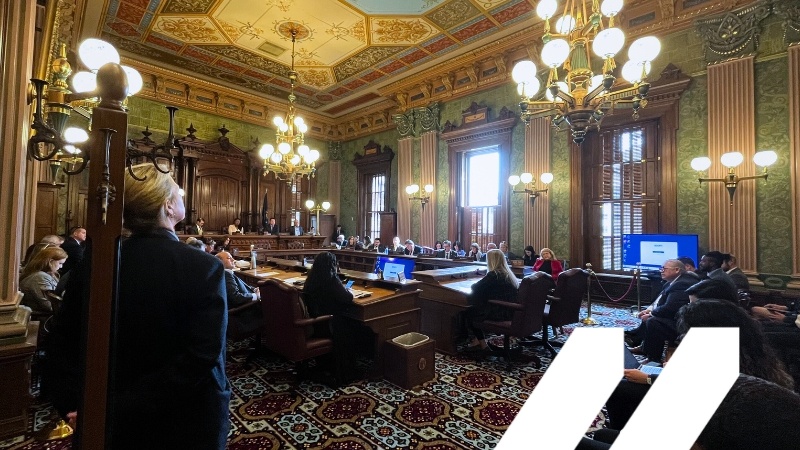
Lansing, Mich. — Earlier today, MCAN Deputy Director Jamie Jacobs testified in front of the Michigan Senate Appropriations Committee in support of Senate Bill 350, which would give Michigan’s Promise Zones more flexibility to address students’ financial needs beyond tuition and fees. Below are her prepared remarks:
"Good afternoon, Chair Anthony and members of the Senate Appropriations Committee. Thank you for the opportunity to testify in support of Senate Bill 350. I’m Jamie Jacobs, deputy director for Michigan College Access Network, a nonprofit, intermediary organization headquartered here in Lansing working to get more students into and through college in support of the State’s Sixty by 30 goal. We prioritize students of color, first-generation college-going students, and low-income students who face significant systemic barriers to college enrollment, persistence, and completion.
"Through bipartisan legislation passed in 2008, our state had the foresight to create Promise Zones. Michigan was the first in the nation to encourage the creation of local Promise scholarship initiatives through state policy. Since 2009, Michigan lawmakers have revised the statute several times to make the legislation more effective. Each Promise Zone is a public-private partnership committed to ensuring that every child in that community has a tuition-free path to at least an associate degree. These communities are working to deliver this promise through private donations, small and large, and by 'capturing' growth in state property tax revenue.
"Through the current law, Michigan’s Promise Zone communities have been supporting students’ tuition and fee costs for over a decade. Our organization applauds the changes outlined in Senate Bill 350 and has appreciated the opportunity to be involved in discussions with the bill sponsor to craft additional language to strengthen supports for students. The changes to Senate Bill 350 would allow Promise Zones to provide financial support to cover a student's additional costs of attendance including housing, food, transportation, and childcare. An important note is that the proposed language does not require Promise Zones to expand their support. Instead, it provides the 15 Promise Zones the flexibility and choice to include additional financial support to students. This is all possible through no additional cost to the State.
"As we think about financial aid for students and families, it’s critical to acknowledge that tuition support in and of itself is not enough. Although most students and families tell you this is their primary barrier to college, not far behind are several other obstacles waiting to take students off course. These financial challenges include transportation, childcare, food, and housing costs.
"According to a 2020 report, the average full-time undergraduate can only cover 19 percent of non-tuition costs with their work-study earnings. Pre-pandemic, 42 percent of community college students indicated they had been food insecure in the last 30 days, 46 percent reported experiencing housing insecurity in the last year, and 30 percent were parents themselves, with childcare as a large expense they struggle to pay. We also know that full-time community college students spend almost $2,000 a year on transportation, which is roughly half of the average community college tuition cost.
"Completing college is a lot harder than when many of us attended, especially for low-income students, students of color, and first-generation college-going students. We must shift strategies and accept the changing landscape to reach Sixty by 30. The more the State can encourage flexibility to support these student needs in addition to tuition costs, the more students we will see complete a certificate or degree.
"The Promise Zone philosophy is simple: invest local taxes on local students to attend local colleges to meet the talent needs of local employers and bolster the local and statewide economy. The Promise Zone legislation was good policy when your predecessors created it; it will be great policy with these changes."
Click here to view the entire committee meeting. Jamie Jacobs' testimony begins at 33:25.
Earlier today, MCAN Deputy Director Jamie Jacobs testified in front of the Michigan Senate Appropriations Committee in support of Senate Bill 350, which would give Michigan’s Promise Zones more flexibility to address students’ financial needs.